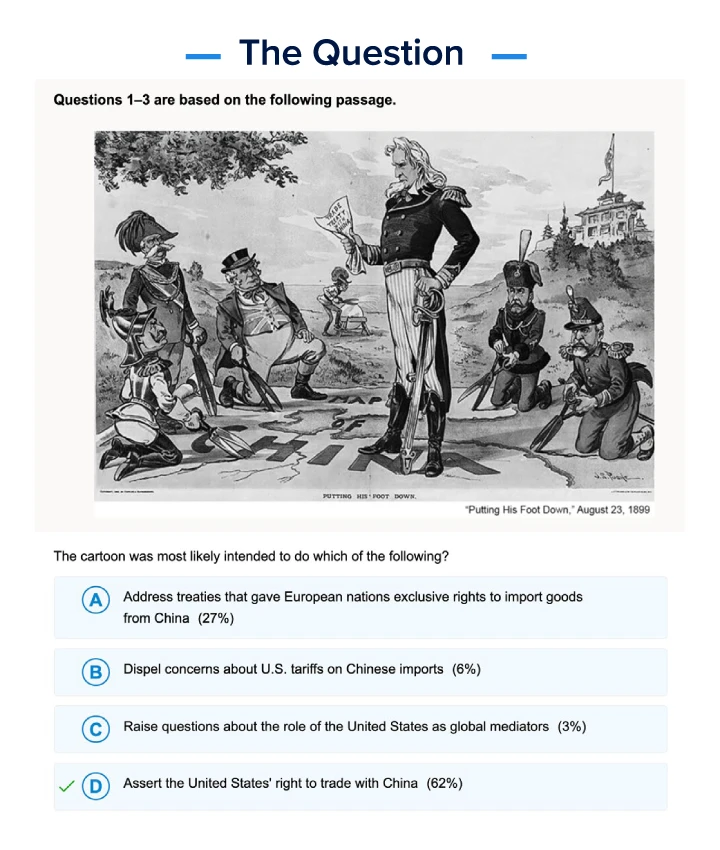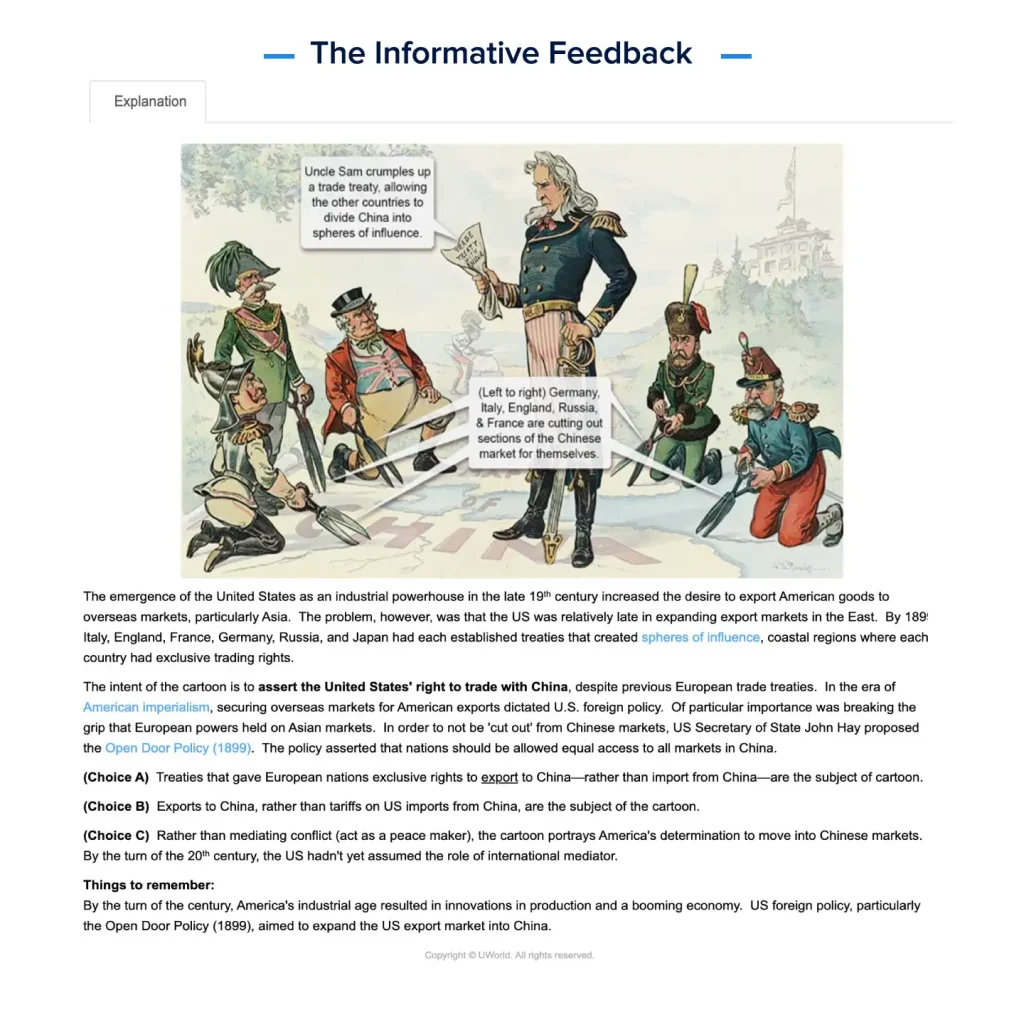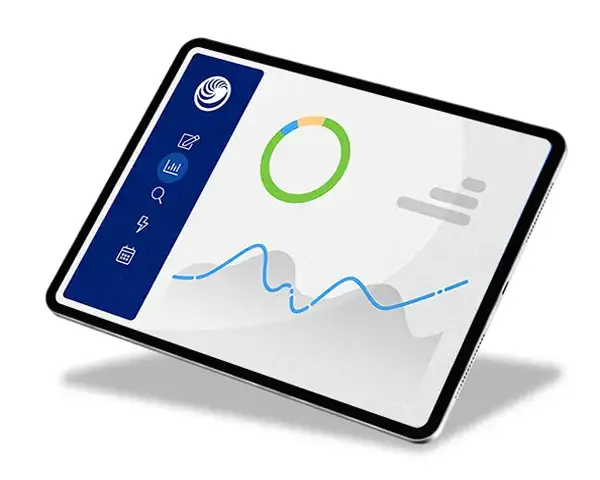Beyond classroom instruction and core materials, students need effective resources to succeed on these high-stakes tests. UWorld provides digital content for the SAT, ACT, and various AP® exam courses. In addition to instructional tools for educators, these resources offer exam-like questions, detailed answer explanations, and easy-to-understand reporting systems to help students focus their study efforts and address learning gaps. Let’s discuss the research behind retrieval practice and formative feedback and how our products align with these educational strategies.
Students Took the SAT® in 2023
Students Took the ACT® in 2023
Students Took an AP® Exam in 2023
Key Takeaways
In real-world educational settings, both retrieval practice strategies and formative feedback strategies have consistently proven to be effective for improving student learning outcomes. A study involving UWorld’s College Readiness tools — designed to support high school students preparing for standardized exams such as the SAT, ACT, and various AP exams — discusses:
- Formative Feedback Strategies: Improve learning and motivation across subjects
- Retrieval Practice Strategies: Enhance recall and metacognition
- Elaborated Feedback: More effective than just indicating correct or incorrect answers
- Immediate and Delayed Feedback: Benefits retention and learning transfer
- Computer-Based Learning: Effective alternatives to human tutoring, offering practice questions, elaborated feedback, and detailed reports
Research on Retrieval Practice Combined with Formative Feedback
Educational research widely agrees that feedback is a crucial part of the learning process. In a 2008 comprehensive review, author Valerie J. Shute summarized decades of evidence showing that well-designed formative feedback — defined as “information communicated to the learner that is intended to modify the learner's thinking or behavior” — improves learning and skill development. This kind of feedback also enhances student motivation to learn, as supported by numerous studies Shute cites.
Positive effects of feedback across subject areas
Feedback positively impacts learning across many subjects. A 2019 meta-analysis of 60 studies with over 6,000 students (from kindergarten to college) focused on reading comprehension improvement. The analysis found a strong effect of feedback on learning8. Other researchers have observed similar benefits in sciences, social sciences, math, and history9.
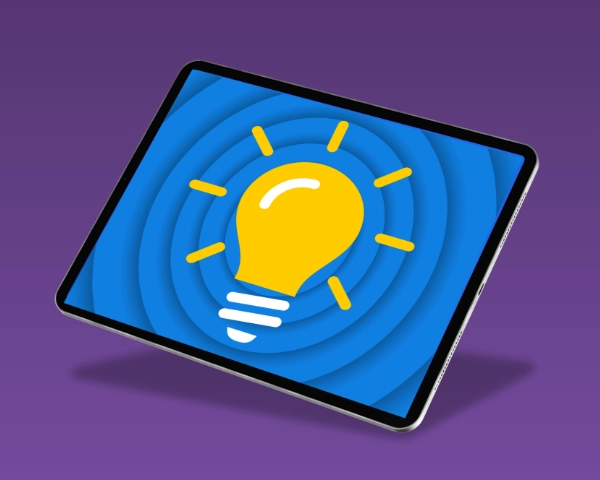
Combining retrieval practice with feedback
In their book Powerful Teaching, Agarwal and Bain draw on cognitive science research to recommend effective teaching strategies, including "retrieval practice." This practice involves activities where learners recall and apply previously learned knowledge or skills after a period of forgetting1.
Agarwal and Bain conclude that combining retrieval practice with feedback is effective for promoting learning and retention. Retrieval practice “boosts learning by pulling information out of students' heads rather than cramming information into them.” Feedback enhances this process by helping students understand what they know and identify gaps in their knowledge, thus increasing their metacognition (p. 5).
Agarwal and Bain explain that feedback during retrieval practice helps counteract overconfidence, where students believe they remember or understand more than they actually do. Their research, along with others, shows that this method — allowing students to make and correct mistakes — improves learning outcomes1.
Benefits of elaborated feedback and correct response feedback
Education research strongly supports the use of elaborated feedback—providing detailed explanations for correct or incorrect answers — during practice.
For instance, Van der Kliej et al. conducted a meta-analysis comparing student learning outcomes from different feedback methods in computer-based environments. They found that elaborated feedback (EF) was more effective than knowledge of results (KR) and knowledge of correct response (KCR). Their study also showed that elaborated feedback had a greater impact on higher-order learning compared to lower-order learning.
Shute’s (2008) review of the literature identified multiple studies where elaborated feedback was more effective than simply verifying results. This finding was confirmed in a more recent meta-analysis by Shute & Rahimi7.
Other researchers have found that students benefit from both elaborated and correct answer feedback1. Swart et al. found evidence supporting this in their meta-analysis focused on reading comprehension skills.
Guidance on high-quality formative feedback
Based on her review, Shute provided guidelines for effective feedback:
- Elaborated Feedback: Should address the topic, response, or specific errors, explaining the what, how, and why
- Clarity: Feedback should be specific, clear, and provided in manageable units
- Goals: Clarify learning goals, performance, and steps needed to reach the goals
- Objectivity: Feedback should be unbiased, with computer-based feedback often seen as more objective
- Timing: Feedback should be provided after learners attempt a solution
The importance of feedback timing
Research robustly supports that immediate feedback improves retention and academic achievement. Dihoff, Brosvic, Epstein, and Cook found that immediate feedback provided a learning advantage for students from elementary to college levels4.
In their studies, Dihoff et al. varied the availability and timing of feedback during practice tests for a final exam. Results showed that immediate feedback increased retention, accuracy in identifying initial responses, and confidence, while reducing repeated incorrect answers4.
Swart et al.'s meta-analysis on feedback for reading comprehension skills found feedback to be most effective when provided immediately after reading, rather than during reading8.
Van der Kliej et al. cited research indicating students prefer immediate feedback and spend more time engaging with it than delayed feedback9.
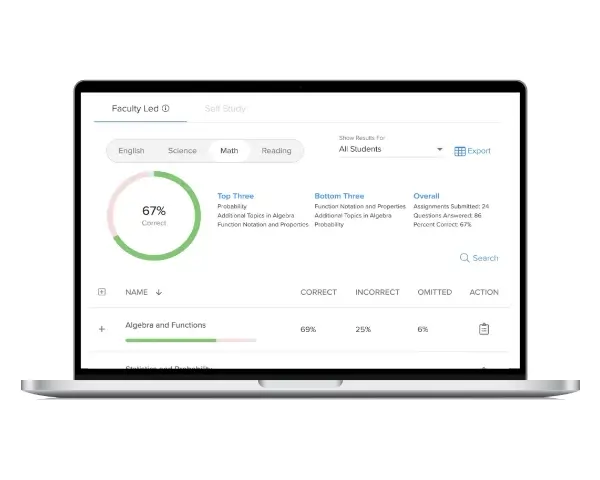
Benefits of both immediate and delayed feedback
Research indicates that both immediate and delayed feedback are beneficial. Agarwal and Bain summarize cognitive research showing positive results from both types. Shute found that immediate feedback is useful for verbal and procedural skills, helping correct errors in real-time. Delayed feedback is more effective for simple tasks and transferring learning to new contexts.
Computer-based learning systems that provide practice with elaborated feedback
Recent decades have seen a focus on computer-based learning environments as alternatives to one-on-one human tutoring. While human tutoring is highly effective due to its adaptability to learner needs9, it is not feasible for widespread use in K-12 education.
Van der Kleij et al. concluded that well-designed computer-based systems can meet the need for individualized learning. These systems include practice questions, timely feedback, and automated scoring.
Swart et al.'s meta-analysis found that computer-delivered feedback was more beneficial for learning reading comprehension skills compared to non-computer-delivered feedback. They recommend using systems with questions and elaborated feedback provided immediately after reading to help readers evaluate and adjust their understanding of the text.
Shute (2008) noted that computer-based systems have the advantage of delivering feedback perceived as unbiased and objective, increasing student engagement with the feedback.
How UWorld’s College Readiness Tools Align with the Research
UWorld’s college readiness solutions are designed to enhance retrieval practice through various forms of elaborated, explanatory feedback, automated scoring, and detailed reporting. These features help students and teachers determine the next steps in exam preparation.
UWorld is designed for effective retrieval practice
UWorld supports classroom instruction, helping students retrieve and apply previously learned facts, concepts, and skills. Students select a subject or topic to study and work through related questions. Informative feedback strategies reinforce learning and address misunderstandings, preventing future mistakes.
UWorld provides students with practice in the various subject areas cited in the research literature
For example, UWorld’s Online Preparation for the SAT Exam covers all SAT topics in the verbal and math sections. UWorld’s Online Preparation for the ACT Exam addresses all ACT topics in reading, grammar, math, and science. UWorld also offers Courses for AP for a variety of classes, including:
- English Language and Composition
- English Literature and Composition
- US History
- World History
- Human Geography
- Macroeconomics
- Calculus AB and BC
- Statistics
- Chemistry
- Physics
- Psychology
- Biology
- Environmental Science
UWorld features a variety of helpful, elaborated feedback
Feedback addresses the topic, explaining the language of the question to help students identify what is being asked. It is specific to each response choice, providing a concise yet detailed explanation of the correct answer, including background, connections to the prompt, and additional context. This helps students understand the how and why of the correct answer. Feedback also addresses specific errors, helping students fill knowledge gaps and correct misunderstandings. The "Things to Remember" feature highlights the most important information about the topic.
UWorld follows research-based guidance on high-quality informative feedback
UWorld engages students in an interactive process where they answer questions and then receive helpful, informative feedback.
UWorld feedback addresses the topic, correct response, and specific errors, explaining the what, how, and why of the problem.
"Things to Remember" highlights key takeaways concisely. Clear, concise language, limited word counts, and boldface or underlining help ensure feedback is easy to digest and not overwhelming.
UWorld offers a choice between immediate and delayed feedback
When setting up a practice test, instructors can choose to provide feedback immediately after each question or after completing the entire assignment or test. This decision can be made based on the context of learning. Immediate feedback is useful after introducing new content, while delayed feedback can stimulate learning transfer after extensive practice.
UWorld’s College Readiness tools are well-designed computer-based systems
UWorld’s systems provide practice questions similar to actual college readiness exams, along with timely, elaborated feedback. They offer flexibility in feedback timing and detailed reporting features, allowing students and teachers to customize practice assignments to meet individual needs.
To read more about how UWorld College Readiness aligns with research on providing practice with elaborated, explanatory feedback to promote recall and enhance learning, download our independent research paper.

References
- Agarwal, P. K. & Bain, P. M. (2019). Chapter 5: Engage students with feedback-driven metacognition. Powerful teaching: Unleash the science of learning. San Francisco: Josey-Bass.
- Anderson, G. (2020, February 10). Long-term successes, short-term declines. Inside Higher Ed. https://www.insidehighered.com/node/5520.
- College Board (2019, September 24). Over 2.2 million students in class of 2019 took SAT, largest group ever. Author. https://newsroom.collegeboard.org/over-22-million-students-class-2019-took-sat-largest-group-ever.
- Dihoff, R., Brosvic, G., Epstein, M., & Cook, M. (2004). Provision of feedback during preparation for academic testing: Learning is enhanced by immediate but not delayed feedback. The Psychological Record, 54, 237-231. https://www.researchgate.net/publication/47461706_Provision_of_Feedback_During_Preparation_For_Academic_Testing_Learning_Is_Enhanced_by_Immediate_But_Not_Delayed_Feedback.
- National ACT (2019). The condition of college & career readiness 2019. ACT, Inc. https://www.act.org/content/act/en/research/reports/act-publications/condition-of-college-and-career-readiness-2019.html.
- Shute, V.J. (2008, March). Focus on formative feedback. Review of Educational Research, 78(1), 153-189.
- Shute, V.J., & Rahimi, S. (2017, February). Review of computer-based assessment for learning in elementary and secondary education. Journal of Computer Assisted Learning, 33, 11-19.
- Swart, E., Nielen, T.M.J., & Sikkema-de Jong, M.T. (2019). Supporting learning from text: A meta-analysis on the timing and content of effective feedback. Educational Research Review, 28. https://scholarlypublications.universiteitleiden.nl/access/item%3A3279997/view.
- Van der Kleij, F.M., Feskens, R.C.W., & Eggen, T.J.H.M. (2015). Effects of feedback in a computer-based learning environment on students’ learning outcomes. Review of Educational Research, 85(4), 475–511. https://research.utwente.nl/en/publications/effects-of-feedback-in-a-computer-based-learning-environment-on-s-4.

